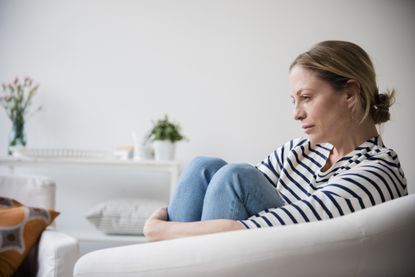Everything you need to know about depression


With experts suggesting that 1 in 4 of us could be suffering from depression, it's likely that you, or someone you are close to, may be affected.
Find out if you or your partner could be at risk, whether antidepressants really work, and what you can do to combat symptoms the natural way...
If you suspect you may have depression, the most important thing is to seek help. There are ways that symptoms can be alleviated - you don't need to suffer in silence.
What is depression?
The symptoms of depression vary from person to person. It's normal to feel sad or low from time to time and if you experience seasonal depression, you may need help learning how to combat SAD, but if you experience little or no respite from sadness or very low mood for a number of weeks, and your symptoms interfere with your work, hobbies, relationships or ability to carry out everyday activities, you may be depressed. Depression is usually diagnosed in those who have suffered from at least five of the following symptoms for at least a couple of weeks:
- Depressed mood most of the time
- Decreased interest in or enjoyment of most activities
- Irritability or intolerance of others
- Tearfulness
- A sense of hopelessness or helplessness
- Recurrent thoughts of death
- Low self esteem
- Feelings of guilt or worthlessness
- Difficulties sustaining concentration or focus
- Excessive anxiety or worry
- Indecisiveness
- Fatigue or loss of energy
- Sleep changes
- Agitation or sluggishness
- Moving or speaking more slowly than usual
- Changes in appetite or weight
- Loss of libido
- Feeling that you may wish to harm yourself
When it comes to physical symptoms, you may also experience constipation or unexplained aches and pains. Depression is typically classified as mild, moderate or severe. Mild depression has some impact on your daily life. Moderate depression has a significant impact on your daily life. Severe depression makes it almost impossible to get through daily life. You can take a test on the NHS Choices website.
Is the experience of depression the same for men and women?
Depression does not feel - or look - the same for everybody. The symptoms and external indicators tend to be slightly different for men and women.
Women are almost twice as likely to be diagnosed with depression, and may be more sensitive to hormonal factors. For example, depression may be triggered by puberty, menstrual issues, pregnancy, giving birth or menopause.
Sign up for the woman&home newsletter
Sign up to our free daily email for the latest royal and entertainment news, interesting opinion, expert advice on styling and beauty trends, and no-nonsense guides to the health and wellness questions you want answered.
However, men are less likely to report depression or seek treatment. Research suggests that women show more visible signs of emotion when depressed, whilst men are (arguably) less likely to cry, showing less emotion. Experts believe that women are more likely to view depression as a signal to seek help, whilst men are more likely to see their symptoms as a sign of failure, causing them to push partners and loved ones away.
MORE:Our round-up of the best CBD oils on offer - to help with stress and anxiety
Men are twice as likely as women to experience episodes of intense, inappropriate anger (or 'anger attacks') when depressed. They are also more likely to report feeling numb, to take excessive risks and to abuse alcohol or other substances. Women tend to spend more time ruminating on feelings of worthlessness or guilt, and are more likely to experience atypical forms of symptoms. For example, whilst depressed people commonly experience insomnia and loss of appetite, women are more likely than men to sleep and eat excessively when depressed.
If you think your husband or partner may be depressed, encourage him to seek help, but be sensitive to the feelings of failure and humiliation which he may be experiencing. Try to avoid using the word 'depression' - instead, focus on visible symptoms, e.g. his fatigue or difficulty sleeping. Treat it as a team effort - use the word 'we' as often as you can.
What causes depression?
Depression can rarely be traced back to a single cause. It is often the culmination of a so-called downward spiral. For example, a stressful event such as the breakdown of a relationship may make you feel low, triggering an increase in alcohol consumption (a system depressant). This, in turn, may cause you to under-perform at work, leading you to feel even worse.
Genes
Certain genes may predispose someone towards developing a depressive illness. It's thought that genetic factors explain about 40% of depression.
Life events
Stressful events such as bereavement, divorce or redundancy often trigger the onset of depression. Giving birth may trigger post-natal depression due to a combination of hormonal changes and physical and emotional stress.
Injury and illness
Head injuries and hypothyroidism (caused by an under-active thyroid) can trigger depression. The stress of living with a long-term illness has also been implicated.
Alcohol and drug use
Alcohol acts as a major system depressant (as do many other substances). Many people reach for a drink when they feel down, but over-indulging tends to make you feel worse in the long run.
Age
Age may also be a factor, with research indicating that peri-menopausal and post-menopausal women are more likely to be depressed. Hormonal Contraception
New research indicates that women taking hormonal contraception are more likely to be prescribed antidepressants, with the Pill, IUS (coil), patch and ring increasing the risk of diagnosis by more than a third.
Inflammation
Recent research has linked depression with systemic inflammation. Inflammation is a protective mechanism triggered by illness or injury, but chronic inflammation - caused by a poor diet, lack of exercise or other environmental factors - can be detrimental. Researchers believe that depression may be a kind of allergic reaction to inflammation. New evidence suggests that anti-inflammatory medicines can improve the symptoms of depression.
How is depression diagnosed?

There are currently no physical tests for depression, although your GP may carry out urine or blood tests to rule out medical conditions such as hypothyroidism. Your GP will offer a diagnosis, and classify your depression as mid, moderate or severe, on the basis of talking through your recent experience and symptoms with you.
How is depression treated?
If you are diagnosed with mild depression, your GP may advise waiting to see if your symptoms improve before recommending any treatment. Exercise, self-help groups, books and online tools may be helpful in the meantime.
If your mild depression does not improve, or you are diagnosed with moderate depression, you may be referred for a short course (usually 6-12 weeks) of talking therapy. This may involve counselling (which aims to help you understand and deal with the causes of your distress) or cognitive behavioural therapy (CBT), which aims to help you develop the skills to tackle negative thought patterns and problematic behaviours. Access to talking therapies is limited in some parts of the UK, and you may be placed on a waiting list.
MORE:Neuroscientist reveals why walking can have an even bigger impact on your wellbeing than you thought
If you are diagnosed with moderate to severe depression, you may be prescribed antidepressants (of which about 30 varieties are currently in use), or antidepressants in combination with talking therapy. You may also be referred to a mental health team made up of psychologists, psychiatrists, specialist nurses and occupational therapists.
Does it work?
Treatment seems to be effective for some people. However, a lot of negative data may remain unpublished. Reviews indicate that antidepressants are only slightly more effective than placebo. One report found that antidepressant medication was just 18% more effective than placebo in the treatment of severe depression. Side effects associated with antidepressant medication include nausea, headaches, loss of libido, a dry mouth, blurred vision, constipation, problems passing urine, sweating, light-headedness, excessive drowsiness, hair loss and increased blood pressure. Talking therapies are generally considered as effective as antidepressants, or slightly more so.
How can I treat my depression without drugs?
Exercise
Exercise has been found to be as effective as antidepressants in treating the symptoms of depression.
Diet
Eating an anti-inflammatory diet, including lots of whole foods, fruit and vegetables, and cutting out processed food and alcohol, may help. There is some evidence that omega 3 and circumin supplements can help to relieve depressive symptoms.
Herbal remedies
Some people find that St John's Wort relieves their symptoms, but you should consult your doctor before taking it, as it can interact with certain medications, including the contraceptive pill.
Mindfulness
Research indicates that mindfulness meditation may be particularly helpful in preventing relapse. It's thought that regular practise helps people to realise that their negative thought patterns are simply thoughts, rather than facts.
Routine
Try to stick to a regular daily routine. Get up and go to bed at the same time each day, cook and eat regular meals, and build in time for some light exercise, such as yoga, walking or swimming.
Hydrotherapy
Research has found that short periods of exposure to cold water can alleviate depressive symptoms. Cold water 'hydrotherapy' increases blood flow to the brain, activates the sympathetic nervous system and helps to calm systemic inflammation. Experts believe that a mechanism similar to electroconvulsive therapy (ECT) may be at work, too - the skin has many more receptors for cold temperatures than warm, so immersion in cold water delivers an "overwhelming" number of electrical impulses to the brain. The treatment also seems to improve symptoms of anxiety.
Some people prone to depression enjoy open water swimming, but even a 30 second shower can help. If you can't face plunging straight in, gradually reduce the heat from a comfortable temperature down to 20°C, sustaining this temperature for between 30 seconds and 3 minutes.
Faye M Smith is an award-winning journalist with over 20 years experience in the magazine industry. Her continued work in the area of natural health won her the coveted title of the Health Food Manufacturers’ Association (HFMA) Journalist of the Year Award 2021. Currently Group Health Director across several magazines including woman&home, Woman, and Woman’s Own, Faye specialises in writing about women’s health, especially menopause, relationships and mental health.
-
 Keira Knightley styles the best chocolate brown blazer with a blush pink skirt, coffee tone jumper and white slingback heels
Keira Knightley styles the best chocolate brown blazer with a blush pink skirt, coffee tone jumper and white slingback heelsAn oversized blazer is the answer to our cold-weather styling dilemmas
By Molly Smith Published
-
 Shetland season 9 ending explained: Who murdered Annie and Bergen?
Shetland season 9 ending explained: Who murdered Annie and Bergen?We delve in the Shetland season 9 final episode to unpick everything happened, and find out who was responsible for the death of Annie and Bergen.
By Lucy Wigley Published